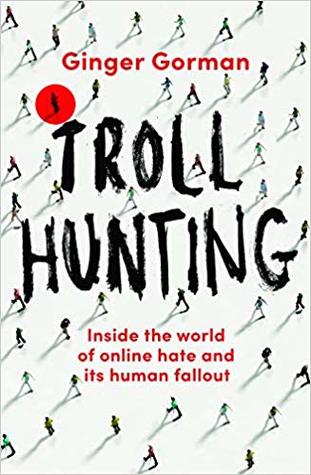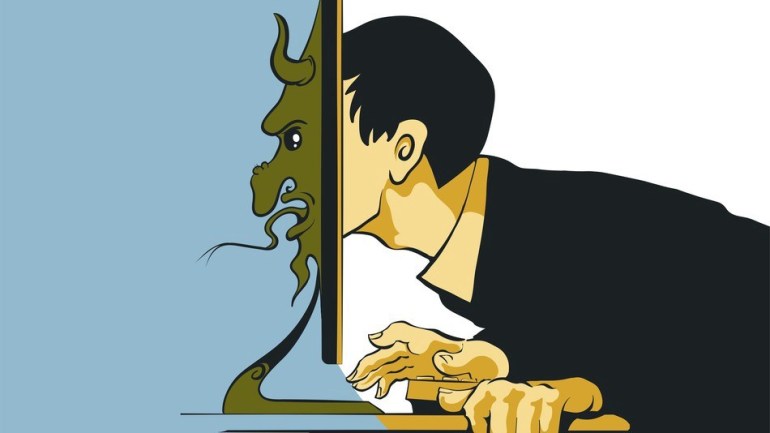
A book review published in The Whistle (Newsletter of Whistleblowers Australia), No. 99, July 2019, pp. 6-7
Ginger Gorman is an Australian journalist. In 2013, right-wing vigilantes began a horrific campaign of trolling against her. She received extremely abusive and threatening messages. Her personal details, including a picture of her, her partner and child, were posted on a fascist website. She and her partner feared physical assault.
For those who have not experienced online hate, it is hard to imagine how damaging it can be. Many targets retreat into a shell, become continually apprehensive and are unable to do their jobs.
Gorman, unlike others, decided that she wanted to learn more about the trolls who were attacking her and others. Being a journalist, she sought to interview them. She recounts her experiences, and what she learned, in her recent book Troll Hunting: Inside the World of Online Hate and its Human Fallout. She also talked with other trolling targets, and with all sorts of experts, including psychologists, police and lawyers, seeking insights. Although the topic has many confronting elements, her treatment is fascinating and engaging.

Gorman is not a whistleblower in the usual sense. She was not an employee who spoke out in the public interest, and those who attacked her had no authority over her. But she is certainly speaking out to challenge abuse. Furthermore, the ways she and other trolling targets are treated has many similarities with the reprisals visited on whistleblowers. So it is worth learning from Gorman’s investigations.
She aimed to understand trolls better by talking with them. Very few whistleblowers try to set up regular conversations with their bosses and colleagues — the ones who are doing the worst things to them — to ask why they are being ostracised, harassed, transferred, referred to psychiatrists and so forth. Why not? When people come under attack, they are often distressed. Psychologically, they do not feel capable of engaging their attackers, at least not in the calm frame of mind necessary to build a relationship and seek greater understanding.
Despite her revulsion at the actions of trolls, Gorman was highly motivated to figure out what drove them, to understand what they were like. She used her media networks to find out how to contact trolls, and struck up lengthy conversations with a few of them.
They were not at all what she expected.
She expected they would be uneducated and inarticulate. Instead, she discovered they were educated and able to reflect on their own actions.
She expected she would find nothing in common with them. Instead, she found herself sharing many ideas, about movies, politics and culture.
She expected to hate them. Instead, she found that, aside from their trolling, which she continued to detest, that she got along with them reasonably well.
Like any contact with strangers, her relationships with different trolls depended on the individual. Still, she found more in common than she expected, especially considering that she was a middle-aged woman, a feminist, interacting with young white men — they were all men — some of whom were overtly racist.
Whistleblowers might imagine that some of their chief tormenters are nasty, ignorant and hostile. Get to know them, and it might well be that they are not much different than anyone else.

Trolls might be approachable in some ways, but they had well-developed mechanisms to protect themselves and justify their activities. For protection, most of them carefully hid their true identities. They justified their trolling by believing that they were the actual victims, and anyway they were just exercising their right to free speech. One troll Gorman interviewed was adamant that words never hurt anyone. If people felt offended, then they should just get off the Internet.
The same sorts of psychological dynamics apply in whistleblower scenarios. Managers feel they are the ones under attack: the whistleblower is seen as the aggressor. In taking actions against whistleblowers, managers are just exercising their usual prerogatives. They don’t see what they are doing as taking reprisals.
From the other side, the experience is completely different. Gorman tells about the horrific consequences for targets of trolling. Constant abuse is hard to handle and can lead to post-traumatic stress disorder. The abuse often includes threats of harm, including rape and murder, to both the target and family members. Doxxing is the process of putting online information about someone, for example name, home address and phone numbers, and encouraging others to harass them. It’s never possible to know whether online abuse and threats might trigger someone to physically attack, which sometimes happens, and this risk leads to continual anxiety and paranoia. Online aggression has offline consequences.
Some targets are so affected that they move house, quit their jobs or stay off the Internet. Quite a few whistleblowers lose their jobs too, so this is another commonality with trolling targets. More generally, trolling campaigns have much in common with reprisals against whistleblowers, the difference being that whistleblowers are usually attacked by people in their workplace whereas trolling targets are attacked by online vigilantes.

Ginger Gorman
Trolling targets often seek assistance from authorities, for example reporting death threats to the police. This is usually a dead end. Few police are well informed and skilled in dealing with online attacks, so they do nothing. Sometimes they say, “Well, don’t go on the Internet.” But if someone reported an assault on the street, police wouldn’t say “Well, don’t go outside.”
Gorman recounts the failures of laws, regulatory agencies and social media companies such as Facebook and Twitter to effectively deal with online abuse. There are plenty of promises but things don't change much. This is the same experience as whistleblowers who regularly report the failure of watchdog bodies to provide adequate protection.
For many people, the phenomenon of trolling might seem remote. It’s not of concern. Because they are not affected, they have no idea that such damaging activities are going on. This is similar to the plight of whistleblowers: unless you’ve been targeted yourself, or are a close friend or family member of someone who has been, it’s hard to appreciate what’s involved.
There is a common cause involved here: the need to support people who are the targets of abusive and unfair attacks. Whistleblower support is not all that different from support for targets of bullying, online or offline or both. It is worth thinking how to learn from these different experiences in order to develop better ways to survive and resist.
Brian Martin is editor of The Whistle.
Brian Martin's publications on suppression of dissent